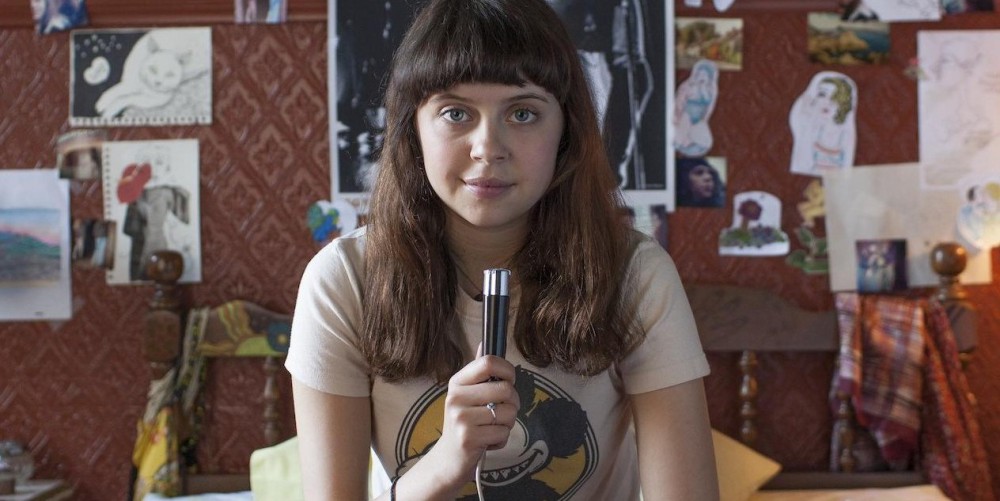
It’s not too hard to comfortably declare The Diary of a Teenage Girl a different breed than some of its companions in modern coming-of-age narratives that focus on young women. Director Marielle Heller immediately separates her adaptation of Phoebe Gloecker’s fascinating novel of the same name from works like It Felt Like Love and Fish Tank—specifically mentioned because they are also made by women—in two ways: presenting this sexual awakening in a positive light and embracing it by never shying away from the sex itself. And it establishes this with no qualms from the very get-go, as the main character Minnie, struts down the street to Dwight Twilley Band’s “Looking for the Magic” and boldly proclaims in voice-over, “I had sex today. Holy shit.”
In lieu of trying to make the writing of a diary interesting, Heller replaces the written diary, which is essentially what Gloecker’s novel is—including an abundance of mini-comics and drawings that feature the characters and all sorts of delightful imagery—with a young woman speaking into a cassette recorder. It’s a smart enough move, and it allows the film to be populated by the voice of the entrancing Bel Powley. To say Powley completely nails the role of a young woman going through the motions of figuring out what she digs and doesn’t dig when it comes to sex in the ’70s—most notably through sleeping with her mother’s boyfriend played by a skeezy-looking, mustachioed Alexander Skarsgård—would somehow be an understatement even though it’s the truth.
It’s not solely in Powley’s vocal work off-screen, much of which can be attributed to a smart script, but her emotional and physical performance. She’s amazing at finding just the right spot between the unbridled passion of an experienced woman and the total vulnerability of a child; exactly what the character begs for in an actress. The way her body moves on screen, you can tell that she understands exactly what it’s like to exist in a body that she doesn’t entirely feel comfortable in yet. Hand in hand with that though is the fact that the film has no reservations with presenting sex and nudity in all its glory, though its issues with queerness in its last act feel strange.
Even in the moments when we should be nervous or worried about Minnie, there’s an air of levity that never quite disappears from Diary, which works to both positive and negative effect. One of the few things that feels a bit off is the fact that not a single individual confronts Minnie about the fact that this relationship that she’s embarking on with her mother’s boyfriend is essentially statutory rape, even though the film ensures that we don’t see her as a victim or him as a total villain. But, in a sense, it’s understandable, as the film is far more interested in exploring exactly what Minnie sees as important, and that’s certainly not something she does.
And even in style, The Diary of a Teenage Girl is dedicated to presenting exactly what Minnie would be feeling. It’s not just that the film’s aesthetic sensibilities are perfectly suited to their period, though much can be said about the impeccable production design that offers up warm San Franciscan tones, delicious home decor and costuming, and an abundance of period appropriate feminist art; Diane Noomin’s DiDi Glitz and Aline Kominsky-Crumb both showing up in film. But it focuses on presenting Minnie’s own art throughout the film, not so slyly mixing it in with reality when appropriate and necessary.
While the animation and original artwork for the film is credited to the talented Sara Gunnarsdóttir, most of it comes across as ever so similar to the art that populates Gloecker’s original novel. Though sometimes it feels a bit too immature—think an animated boner popping out from a young man’s bulge—it works to gorgeous effect in other scenes, most notably when Minnie takes acid and rises up in the air with beautifully animated wings. And it’s not just in animation, as the film tosses in gorgeous imagery in other moments as well; a bathroom filling up like a forest and Minnie sinking into the ocean that is her bathtub in a bout of depression.
These are simply things that a teenage girl would more than likely imagine and that sense of youthful wonder feels just right alongside the film’s mature themes and explorations. And if one were to remove that lightness of being from The Diary of a Teenage Girl, its focus on sex wouldn’t be as special as it is. She jokes about sex in the ways that folks learning to enjoy it should, and also takes command when she must to achieve her own pleasure. One scene in particular in which Minnie shifts from underneath a man with no clue what he’s doing to on top and getting off in her own way is a perfect, and entirely realistic (been there, done that) showcase of exactly that.
What’s more fascinating is the way that the film contrasts and complements Minnie’s narrative with that of her mother—played by Kristen Wiig, who continues to remind the world that she’s just as great at drama as she is comedy—and her boyfriend Monroe. Heller does a damn fine job at exploring both of these pivotal figures in Minnie’s life and the extreme vulnerability that both adults hide but inevitably reveal to her within a limited timespan. While the film admittedly tries to make its characters more “likeable” than the novel does, Heller isn’t afraid of depicting her protagonist as the sexually active girl she is, no matter how many folks might stupidly call her a slut.
It’s because of this dedication to presenting the sexual side of coming-of-age without shame and with a sunnier disposition than other films of its kind, that Marielle Heller succeeds with her adaptation of The Diary of a Teenage Girl. It’s a movie about young women, for young women—regardless of what the nonsensical R-rating might tell you—that wants them to accept that all of this is just part of growing up, and go home knowing that, at the end of the day, Minnie speaks the absolute truth: “So maybe nobody loves me. Maybe nobody will ever love me. But maybe it’s not about being loved by somebody else.”
—
The Diary of a Teenage Girl is currently undergoing a limited theatrical release in the US.
Directed by Marielle Heller; written by Marielle Heller; based on the novel by Phoebe Gloeckner; starring Bel Powley, Alexander Skarsgård, Kristen Wiig and Christopher Meloni; 102 minutes.



 Derek
Derek
 Isabelle
Isabelle